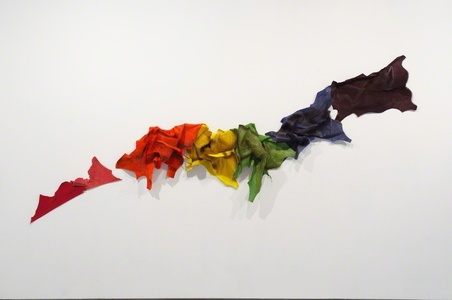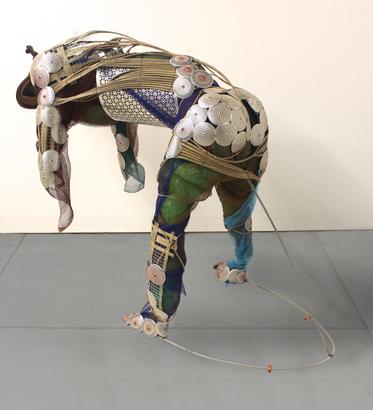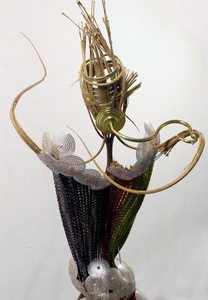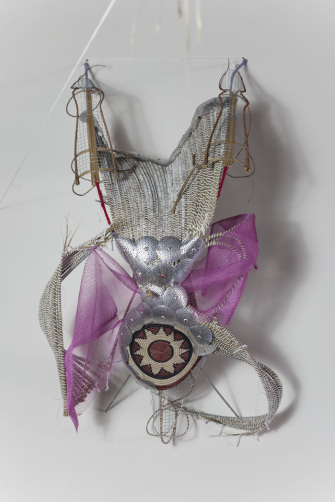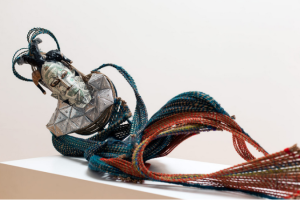
Adejoke Tugbiyele
Grassroots
February 25th – April 9th, 2016
Reception: Thursday, February 25th, 2016
Skoto Gallery, New York
Homeless Hungry Homo, 2014.
Statement:
“One day I woke up and it dawned on me that simply choosing to be me WAS the protest. By boldly saying these words: “My name is Adejoke, I am black/African and I love women, could I possibly inspire a young woman out there facing her own personal demons? A girl who had her genitals cut at birth, before she could even speak…a fourteen year old girl forced to marry some forty year old against her will. or a young student who has been raped by thug militants. What about the woman who feels voiceless because she is neither allowed to study nor vote. The woman who fears speaking her truth and being cast out – rejected by her family, community and church/mosque. Or the older woman trapped in an abusive marriage and too scared to leave because maybe in her hood/village she has very few means for providing for herself and children. I woke up and realized that by simply choosing to live, but to live authentically… by choosing to love unconditionally, do the best work I can and recognize those who came before me, perhaps a woman out there might find the courage to break free and do the same, in her own way and at her own time. Just as countless women, gay and straight, have surely inspired me. The journey is never as easy or straightforward as it seems, but I chose to take the journey regardless and not just for me alone.
Springbok Colours, 2015.
Since birth I have been on a journey towards a global Black experience – born and raised in Brooklyn’s Crown Heights, further seasoned in Lagos for seven formative years, later educated in Newark and Baltimore, a former resident/frequent-flyer to Harlem and most recently, a two-month long stay in Johannesburg. I still remember the smell of London’s Little Lagos and I look forward to my first trip to New Orleans, Dakar, Guangzhou and other cities Black people call home. Part of my mission in making art is to help people understand and relate to the suffering of Blacks/Africans who face discrimination and injustice on a daily basis. Ethnic discrimination, lack of understanding and xenophobia among Blacks/Africans also puts a dent in the fight against poverty and white privilege.
Past Future, 2015.
Last but not least, I work in order to give voice to injustices against LGBTQ people in Africa, where thirty-seven countries still outlaw same sex love. Beyond the impact of hate-politics and extremist religion’s homophobia on the gay community, I also relate to the shared experience of the strain on familial bonds, as well as the initial work of facing one’s own demons which, if not done can lead to severe depression and suicide. Love should not kill.
Musician II, 2014.
At the end of the day, what I’m really talking about is not simply about race, gender and sexuality. It is about judgment. The first three are surface issues, but judgment is the core problem. Apart from the general work we all do, much of the work in life is simply unpacking. Unpacking the judgments and expectations of others. If you’re Black, the expectation to look White. The expectation to “behave” like a woman and constantly act or sound submissive to men AND other women, even when you know exactly what you’re talking about. The expectation to be straight when every part of your physical and mental health/well-being tells you you’re gay. So much to unpack! Unpacking a deep self-loathing in that search for the freedom to simply be you and love yourself unconditionally. It’s so bad that there are people who come into your life who never, ever carried a single judgment of you and you didn’t recognize them because of the baggage you were carrying about yourself. And oftentimes those are the very people who’s view of you is way more accurate than what you see when you look in the mirror. I hope and pray that my art, and indeed my life, reflects the best and not the worst that others see in me.
My art practice seeks truth, balance and fairness. I subscribe to the age-old notion of ethics/aesthetics what we now call art and activism or the return to agitprop. With sharply rising inequality in these modern times our collective ethics is in serious question. I keep all of this in mind when I work. Transformation of my materials is a metaphor for the transformation of myself and, hopefully, others.
Love,
Adejoke, 2016 “ (statement on website Skoto Gallery)

